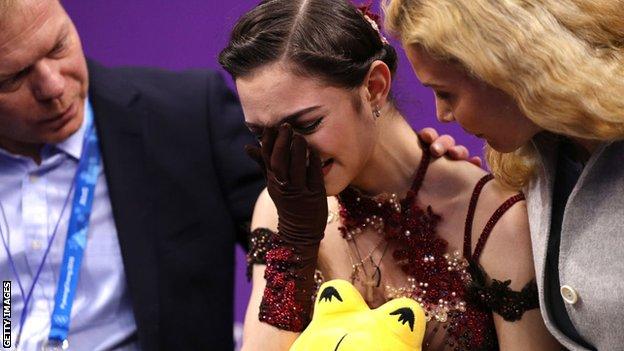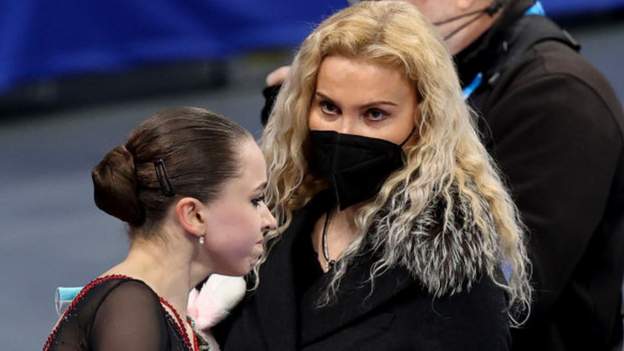Winter Olympics: Eteri Tutberidze is Kamila Valieva’s coach
[ad_1]
| Hosts: Beijing, China Dates: 4-20 Februar |
| Coverage:Live on BBC TV, BBC iPlayer or BBC Red Button, online and on BBC TV; listen on BBC Radio 5 Live (BBC Sounds) and BBC Radio 5 Live (BBC Radio 5 Live). Live text and highlights are available on BBC Sport’s website and mobile app. |
It’s not a good training method to confront a 15-year-old who is sobbing at the Olympic Games.
According to the International Olympic Committee, “Chilling” is key. According to the Russian government, “Key” is essential for athletes to win.
According to the millions of people who witnessed it this week, it is the Eteri Tutberidze type.
All the events surrounding Kamila Valieva, her young skater, at these Beijing Winter Olympics have brought the spotlight onto a coach who has produced a number of young champions over the years.
So, what do we know so far about the Russians and their methods? What will happen if anything changes?
A former ice dancer & award-winning coach
Tutberidze, 47 years old, is a former ice dancing instructor who lived in the United States during the 1990s and worked in ice shows for six year.
She was involved in the Oklahoma City bombing of 1995, which resulted in the deaths of 168 people. She was with her group, who were staying just a few blocks from the Federal Building where the explosion occurred. They received compensation for being victims of the attack.
She was in the US with her daughter Diana Davis. Diana finished 14th in the ice dancing competition at Beijing 2022, along with Gleg Stmolkin. Davis was not trained by her mom.
Tutberidze started her coaching career in the USA, but she then returned to Russia and joined the Sambo 70 club in Moscow. She became a household name when she coached Yulia Lipnitskaya, 15, to gold medal with Russia at Sochi 2014.
She has been awarded many coaching awards since then, including the International Skating Union’s coach of year award in 2020 and the state award in 2018, which was presented her by Russian President Vladimir Putin.
At the time, she was described by ISU as a “talented Coach” who had “given so many strength and dedication to her athlete this season.”
Early success and early retirement
The difference between Tutberidze’s skaters and others on the global stage is their athleticism and age.
Lipnitskaya won gold in the 2014 Olympics. Alina Zagitova was 15, when she won it. Evgenia Medideva was 18 years old.
Everything was pointing towards a sweep by Russian teens of the podium places. At the European championships in January, they had achieved exactly that with Valieva finishing ahead Anna Shcherbakova et Alexandra Trusova.
Trusova, 17-year-old Shcherbakova, and Trusova took the gold and the silver. Valieva was fourth after an error-laden performance in Thursday’s free skate. It came after a very difficult 10 days in the course of which she was allowed to continue competing despite having failed a drug screening.
They are also known as the “quad squad” because they perform quadruple jumping, which is the most difficult and rare form of women’s figure skaters. They were among only 25 participants in the individual event who attempted any.
Tutberidze is proud of their youthful age at winning. Many of them are still teenagers when their retirement comes.
Her skaters have the reputation of being “disposable” in skating circles – Beatrix Shuba, 1972 Austrian figure skating champion, once said it – and are part of a production line.
It is not surprising that they are not long-lasting. The high-scoring quads, which rotate four times per second mid-air, are easier to perform when you have a smaller body and narrow shoulders.
Robin Cousins (BBC commentator, 1980 figure skating champion) said: “It’s the little girls bodies that allow that kind of rotation to happen. It is the same thing with gymnastics.”
“With the guys, 30 year-olds can do them.” [quads]The male physiology seems different, and allows for the same longevity as the female body.
Valieva may be banned if she fails a drug test. Trusova stated that she is considering her future after an outburst about missing out on gold.
Tutberidze’s tough’ methods
Tutberidze stated that she champions people through love and not strictness in a 2018 interview she gave to Russia’s Channel One.
She stated that she doesn’t want to demand anything, but that she wants athletes to feel unsatisfied by their inability to complete a task so that they “feel disgust within themselves”.
Medvedeva stated last year that Tutberidze’s methods “work, but as you age, it becomes harder to put up for it”, and that she was sometimes “half-starving”.
At 17 Lipnitskaya was diagnosed with anorexia and began treatment. Medvedeva has since suffered a permanent injury to her back from Tutberidze’s “toughness”.

What is Tutberidze’s view of the Valieva case after?
Thomas Bach, IOC president, stated that it “doesnt give me much faith” in Valieva’s entourage after seeing how she sobbed on Thursday. Tutberidze instead asked: “Why did your stop fighting?””.
Bach stated, “When I saw her being received by her closest entourage in what appeared to have been a tremendously coldness, it was chilling.”
Dmitry Chernyshenko (Russian deputy prime minister) responded to Bach saying: “We are deeply disappointing to see an IOC presidency weave his fictional narrative on the feelings and then present these publicly to the IOC as the voice.
“This is utterly inappropriate and wrong. We know that our athletes are world-beating regardless of whether they win or lose.
In relation to the anti doping investigation, Valiera’s circle of friends is also being scrutinized. The World Anti-Doping Agency has announced that it will launch an investigation into her coaches, doctors, and all other adults who surround her.
It is likely that they include Daniil Glaikhengauz and Sergei Dudakov who have been to Beijing as well as Filipp Shvetsky, team doctor.
Is it possible to increase the minimum age for competition?
Many people are questioning the wisdom of raising the minimum age for seniors to compete in the sport from 15, both to protect them and also to make it more competitive in regards the number of jumps they can perform.
In seven of the eight Olympics, teenagers have won the singles gold medal for women in the women’s singles.
Mariah Bell, American skater, said this week that “I believe there should be a limit on age.” “I know that when you grow there are a lot more changes. There are minors competing…that’s quite a different thing.”
Adam Rippon, her coach added, “If two people are competing against one another, like a women who has breasts and hips and gets a period against a little girl who weighs 80 pounds, then is it fair?”
Age limits are set and determined by individual sports federations rather than the IOC.
Perhaps it is the quadruple leap that needs to be considered – what coaching methods will be used if older skaters try to get a young skater’s jumping?

